
WASHINGTON — Defense Secretary Lloyd Austin was released from the hospital Monday, after spending two weeks there to treat complications from surgery for prostate cancer he kept secret from senior Biden administration leaders and staff for weeks.
He will be working from home as he recovers, and his doctors said he “progressed well throughout his stay and his strength is rebounding.” They said in a statement the cancer was treated early and his prognosis is “excellent.”
Austin, 70, was admitted to Walter Reed National Military Medical Center on Dec. 22 and underwent surgery to treat the cancer, which was detected earlier in the month during a routine screening. He developed an infection a week later and was hospitalized Jan. 1 and admitted to intensive care.
What to know:
- Secrecy surrounding Defense Secretary Lloyd Austin’s hospitalizations due to prostate cancer surgery set off a political firestorm recently.
- The secrecy put an intense spotlight on what staff knew when and why they didn’t inform government leaders or the public. Here’s a timeline.
- Austin was admitted to a medical center on Dec. 22 and underwent surgery to treat the cancer, which was detected earlier in the month during a routine screening.
President Joe Biden and senior administration officials were not told about Austin’s hospitalization until Jan. 4, and Austin kept the cancer diagnosis secret until Jan. 9. Biden has said Austin’s failure to tell him about the hospitalization was a lapse in judgment, but the Democratic president insists he still has confidence in his Pentagon chief.
The lack of transparency about Austin’s hospitalization, however, has triggered administration and Defense Department reviews on the procedures for notifying the White House and others if a Cabinet member must transfer decision-making authorities to a deputy, as Austin did during his initial surgery and a portion of his latest hospital stay. And the White House chief of staff ordered Cabinet members to notify his office if they ever can’t perform their duties.
It is still unclear when Austin will return to his office in the Pentagon or how his cancer treatment will affect his job, travel and other public engagements going forward. Deputy Defense Secretary Kathleen Hicks has been taking on some of his day-to-day duties as he recovers.




